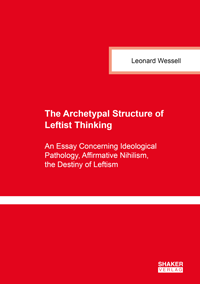
Shop : Details
Shop
Details
49,80 €ISBN 978-3-8440-7388-1Softcover242 pages363 g21 x 14,8 cmEnglishThesis
September 2020
Leonard Wessell
The Archetypal Structure of Leftist Thinking
An Essay Concerning Ideological Pathology, Affirmative Nihilism, the Destiny of Leftism
During the last few decades, American political life has been filled with ideological movements along with their terms, epithets and designations that are frequently used remorselessly as noms de guerre, yet simultaneously they supposedly mediate cognitive content that should enable “rational” dialogue, but seldom achieve more than confusion and confliction. Such movements are “Marxism”, “leftism”, “(American) liberalism”, “new leftism”, “postmodernism”, “progressivism” “radicalism” and even ideological formulations rendering the approaching demographic suicide of the West palatably acceptable to the Western public. Understanding the unity of such movements constitutes the ostensible task of the study, thereby introducing an insight into the often cacophonous universe of contemporary political discourse with its frequent outbursts of violence. The author, a retired professor with doctoral titles both in literature and philosophy, identifies a common generative way of thinking, of posing questions, of evaluating that as an underlying creative force engenders variegated ideologies clearly differing from one another relative to explicit thought, theory, values and programs; and the dynamic of such ideating constitutes a way of thinking still operative in the 21st Century. The study is not presented as a definitive analysis, rather as a prima facie investigation of the very same way of thinking about society that generates diverse and differing ideologies as pathological variants. For this reason, the manner of ideologically ideating is archetypal. The generic name for such archetypal pondering is << thinking in a leftist manner >>, a way that continually reveals itself to be a pathological, indeed, annihilative factor in any unfortunate body politic that is its host. The selection of “leftism” as the generic –ism informing multitudinous others is not fortuitous, rather refers to its historical appearance being the first instance of said pathology – and this momentous event was the French Revolution (1789ff). During the French Revolution, the term la gauche / the left first came into existence as a political designator. Le gauchisme / leftism is the ancestor to and the archetypal structure generating all subsequent ideological movements named above. In summary, the ideological structure of this most fateful event repeats itself in variant forms in the movements mentioned above.
As Prof. Johnathan Israel (others too) has gloriously proclaimed in his many lengthy studies, the French enlighteners and democratic revolutionaries experienced French monarchical society as so nauseating, antihuman, wicked and revolting that they were passionately and categorically impelled to reject the entire edifice – institutions, manners of behavior, law, authority, religion, symbols and even style of dress, etc. – such that they set out, as Thomas Paine effused, to “lay the axe [annihilate] to the root [= foundation of society], and teach governments humanity”, i.e., reconstruct society with a total [and as J. L Talmon noted, ‘totalitarian”] universality eradicating all wrong of the existing society, even engineering a moral change in humankind and thereby creating an new and superior human being. << The archetypal structure of thinking in a leftist manner drives from a serious and fateful encounter with a felt radical wrong, systematic injustice which in turn imperatively impels the leftist to react by revolting, deconstructing or annihilating the “what is” of a society so as to create the “what ought to be” as a “fundamental transformation” >>. This model is repeated in all the ideological movements noted: The French revolutionaries produced the original structure of the pathology; Marxism is the most violent of transformations; New Leftism is the most successful with it sexual proclivity; Postmodern is intellectually the most vile with it destruction of reason; American liberalism is transformatively the most timid, but still seeks the “new man” and the approaching demographic suicide of the West, that nihilistic finale of Leftism’s voyage into nothingness. As ideological ideating leftism tends invariably to nihilism and affirms it.
As Prof. Johnathan Israel (others too) has gloriously proclaimed in his many lengthy studies, the French enlighteners and democratic revolutionaries experienced French monarchical society as so nauseating, antihuman, wicked and revolting that they were passionately and categorically impelled to reject the entire edifice – institutions, manners of behavior, law, authority, religion, symbols and even style of dress, etc. – such that they set out, as Thomas Paine effused, to “lay the axe [annihilate] to the root [= foundation of society], and teach governments humanity”, i.e., reconstruct society with a total [and as J. L Talmon noted, ‘totalitarian”] universality eradicating all wrong of the existing society, even engineering a moral change in humankind and thereby creating an new and superior human being. << The archetypal structure of thinking in a leftist manner drives from a serious and fateful encounter with a felt radical wrong, systematic injustice which in turn imperatively impels the leftist to react by revolting, deconstructing or annihilating the “what is” of a society so as to create the “what ought to be” as a “fundamental transformation” >>. This model is repeated in all the ideological movements noted: The French revolutionaries produced the original structure of the pathology; Marxism is the most violent of transformations; New Leftism is the most successful with it sexual proclivity; Postmodern is intellectually the most vile with it destruction of reason; American liberalism is transformatively the most timid, but still seeks the “new man” and the approaching demographic suicide of the West, that nihilistic finale of Leftism’s voyage into nothingness. As ideological ideating leftism tends invariably to nihilism and affirms it.
Keywords: Leftist Thinking; Leftism; Postmodernism; American Liberalism
Export of bibliographic data
Shaker Verlag GmbH
Am Langen Graben 15a
52353 Düren
Germany
Am Langen Graben 15a
52353 Düren
Germany
Mon. - Thurs. 8:00 a.m. to 4:00 p.m.
Fri. 8:00 a.m. to 3:00 p.m.
Fri. 8:00 a.m. to 3:00 p.m.
Contact us. We will be happy to help you.



